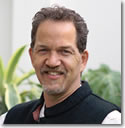Presenting the findings at the Australian Yoga Therapy conference in Melbourne this coming Saturday, Professor Cohen, who supervised the research and is Foundation Professor of Complementary Medicine at RMIT, said, "These findings support regular yoga practice as an effective, affordable and ultimately
safe form of exercise for older people in addressing insomnia".
The 12-week study formed the basis for PhD graduate Jonathan Halpern's research at RMIT, in which he investigated whether yoga could improve sleep and the quality of life of 74 people aged between 60 and 87.
"Insomnia is a debilitating problem that is one of the most frequent health complaints in the elderly – we wanted to explore this because insomnia impairs daily function, reduces quality of life and is a risk factor for other health issues for older people," Professor Cohen said.
"Drugs used to help treat this condition are only recommended for short term use and have limited effectiveness. Drugs also have severe limitations including tolerance, addiction and drowsiness, which poses additional risks of falling or having accidents for this age group," he said.
The 74 participants in the study, who were based in Israel, undertook two weekly classes of physical and meditative yoga as well as daily home practice of meditative yoga over 12 weeks. The yoga practices were tailored for elderly participants, and were supported by an audio CD to guide the home practice.
The study was undertaken in collaboration with the Shaare Zedek Medical Centre in Israel and with the Israel Yoga Teachers Association, with a grant from the Australia Israel Scientific Exchange Foundation (AISEF).
The research findings revealed that practising yoga for at least 25 minutes a day for 12 weeks improved the participants' sleep as well as enhanced their psychological and emotional wellbeing. Compared to the control group, the people undertaking yoga showed subjective improvements in numerous aspects
of their sleep, including how efficiently they slept, how deeply, and for how long. Participants reported improvements in general wellbeing, and overall mental health, and their ability to function physically, emotionally and socially.
Professor Cohen noted that those participants with a high level of compliance reported a higher rate of benefit. "At least 25 minutes of daily practice is needed to significantly improve insomnia symptoms".
"It's important to also point out that home practice, under the guidance of an audio CD, was found to be safe as well as beneficial. On top of the safety and efficacy findings, this type of yoga practice does not cost anything, and is relatively easy to do," he said.
Professor Alan Bensoussan, the Interim Director of the National Institute of Complementary Medicine (NICM), has acknowledged this new evidence on the effectiveness of yoga in insomnia. "This is part of a growing body of evidence for the effectiveness of yoga in a wide variety of health conditions,"
he said.
The NICM classifies yoga as one of the mind-body therapies making up the wider domain of complementary medicine. The NICM was established in 2007 to provide leadership and support for research into complementary medicine and translation of research-based evidence into clinical practice and relevant
policy to benefit the health of all Australians.
The clinical trial in Israel was supervised by Dr Clement Cahan, Director of the sleep laboratory at Shaare Zedek Medical Centre and former president of the Israel Sleep Research Association.
The Australian Yoga Therapy conference runs from Saturday 18 to Sunday 19 August and will also feature presentations from leading Australian and international yoga researchers.
For more information, contact:
Kevin Slack, RMIT University, Marketing and Communications: (03) 9925 1639 or 0439 499 008, kevin.slack@rmit.edu.au
 Traditional yoga practice has been shown to benefit elderly people with insomnia and can help to improve their mental and emotional health,
according to Professor Marc Cohen from RMIT University.
Traditional yoga practice has been shown to benefit elderly people with insomnia and can help to improve their mental and emotional health,
according to Professor Marc Cohen from RMIT University.